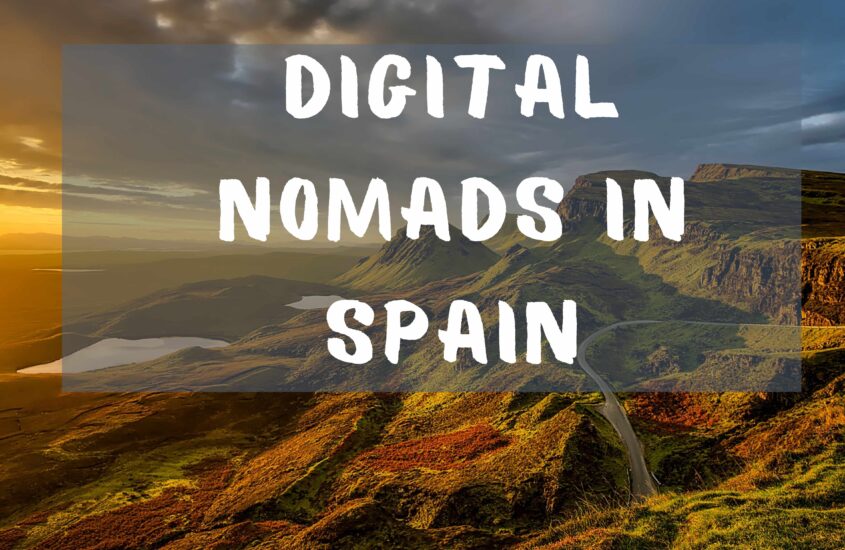Digital Nomads in Spain: A Guide to Working and Living

As remote work becomes more common and technology advances, the number of digital nomads is growing worldwide. These location-independent professionals are able to work from anywhere with a good internet connection, and many choose to travel the world while earning a living. One country that has become increasingly popular among digital nomads is Spain, with its warm climate, stunning beaches, vibrant culture, and affordable cost of living.
Spain is a country full of contrasts, with a rich history, vibrant culture, and diverse landscapes. From the bustling streets of Madrid to the pristine beaches of the Balearic Islands, there is something for everyone. With its mild winters and hot summers, Spain’s Mediterranean climate is an ideal destination for those who love the sun. In addition, compared to other European countries, Spain has a relatively low cost of living, with affordable housing, food, and transportation.
For digital nomads, Spain offers a unique blend of work and play. They can spend their days working from a coworking space or a café, and then spend their evenings exploring the country’s cultural attractions, trying new foods, or relaxing on the beach. Spain has many beautiful cities and regions, each with its own unique charm. Barcelona, Valencia, Madrid, Seville, and Granada are just a few of the top destinations for digital nomads in Spain.
In this guide, we’ll take a deep dive into the world of digital nomads in Spain, exploring everything from visa requirements to top destinations to work and play. So, if you’re ready to pack your bags and head to the land of sun, sea, and siesta, read on!
Why Spain is a Great Destination for Digital Nomads
Spain has become an increasingly popular destination for digital nomads from around the world, and for good reason. There are many factors that make Spain an ideal destination for remote workers who want to combine work with a great quality of life.
First and foremost, Spain’s Mediterranean climate is a major draw for many digital nomads. With warm, sunny weather for most of the year, Spain offers a great escape from colder climates. Whether you prefer the beaches of the Costa del Sol, the mountains of the Pyrenees, or the vibrant cities of Madrid and Barcelona, Spain has something to offer for everyone.
Another major factor that makes Spain a great destination for digital nomads is its affordability. Compared to other European countries, Spain offers a relatively low cost of living, with affordable housing, food, and transportation. This makes it an ideal destination for those who want to stretch their budget and make the most of their earnings as a remote worker.
Spain also has a rich and diverse culture, with a long and fascinating history, stunning architecture, and delicious food and wine. Whether you want to explore ancient castles, stroll through medieval villages, or savor tapas and paella at a local bar, there’s no shortage of things to see and do in Spain.
For digital nomads, Spain also offers a vibrant and growing community of like-minded individuals. Coworking spaces are becoming more common throughout the country, and there are many events and meetups where nomads can connect and network with each other. This sense of community can be invaluable for remote workers who may otherwise feel isolated or disconnected from others.
Visa Requirements for Digital Nomads in Spain
If you’re a digital nomad considering a move to Spain, you’ll need to be aware of the visa requirements for working and living in the country. The good news is that Spain is a relatively welcoming destination for remote workers, and there are several different visa options available depending on your situation. Digital Nomad Spain. At Lexidy our lawyers will guide you to obtain your Visa for Digital Nomads in Spain, contact us!
If you’re a citizen of an EU or EEA country, you don’t need a visa to work and live in Spain. You can simply register as a resident at your local town hall and start working right away. However, if you plan to stay in Spain for more than three months, you’ll need to register with the Central Register of Foreign Nationals (Registro Central de Extranjeros).
If you’re a citizen of a non-EU country, you’ll need to apply for a visa before you can enter Spain. There are several different visa options available depending on your situation. The most common visa for digital nomads is the non-lucrative visa, which allows you to live in Spain for up to one year without working. This is ideal for remote workers who have a steady income from their work and don’t need to find local employment.
To apply for a non-lucrative visa, you’ll need to show proof of sufficient financial resources to support yourself during your stay in Spain. You’ll also need to provide a clean criminal record, a medical certificate, and proof of health insurance. The application process can take several months. So it’s important to plan ahead and apply well in advance of your planned arrival in Spain.
Top Destinations for Digital Nomads
Spain is a popular destination for digital nomads, offering a warm climate, beautiful scenery, and a relaxed way of life. Whether you’re looking for a bustling city or a tranquil beach town, Spain has something to offer every remote worker.
Barcelona is one of the most popular destinations for digital nomads in Spain. Known for its stunning architecture, vibrant culture, and world-class food scene, Barcelona is a top choice for remote workers. The city offers a range of co-working spaces and cafes with high-speed internet. As well as plenty of opportunities to explore and socialize.
Madrid, the Spanish capital, is another top destination for digital nomads. With a rich history and culture, Madrid is home to many co-working spaces, cafes, and other resources for remote workers. With a lively nightlife and a thriving cultural scene. Madrid is a great choice for those who want to balance work with leisure.
Valencia is a coastal city known for its beaches, parks, and stunning architecture. It’s also home to a growing community of digital nomads, thanks to its affordable cost of living, friendly locals, and excellent quality of life. With a range of co-working spaces and cafes, Valencia is a great place to work and live.
Malaga is another coastal city that’s becoming popular with digital nomads. With its sunny climate, sandy beaches, and laid-back atmosphere, Malaga offers a great quality of life for remote workers. The city is home to several co-working spaces and cafes, as well as plenty of opportunities for outdoor activities. Seville, the capital of Andalusia, is a city known for its history, culture, and stunning architecture. With its warm climate, friendly locals, and affordable cost of living. Seville is becoming an increasingly popular destination for digital nomads.
Cost of Living for Digital Nomads
Spain is a popular destination for digital nomads, thanks to its warm climate, beautiful scenery, and relaxed way of life. One of the key advantages of living and working in Spain as a digital nomad is the cost of living. While living costs in Spain can vary depending on your location, lifestyle, and accommodation choices. It’s generally more affordable than many other Western European countries.
One of the biggest expenses for digital nomads in Spain is accommodation. Depending on where you choose to live, rental prices can vary greatly. Large cities like Barcelona and Madrid tend to be more expensive, while smaller towns and cities are more affordable. That being said, Spain offers a wide range of accommodation options for digital nomads, from shared apartments to private studios and villas.

Another major expense for digital nomads in Spain is food. Spain is known for its world-class cuisine, but eating out can be expensive in some areas. However, many restaurants and cafes offer affordable menus del dia (menu of the day) that include several courses and a drink for a fixed price.
Transportation costs in Spain can vary depending on your location and travel habits. Public transportation in cities like Barcelona and Madrid is relatively affordable, with monthly passes available for a reasonable price. Taxis and ride-sharing services like Uber are also available in most cities, but can be more expensive.
Other living expenses for digital nomads in Spain include utilities, internet, and leisure activities. Utilities costs can vary depending on your accommodation and usage, but are generally affordable. High-speed internet is widely available in Spain, with many cafes and co-working spaces offering free Wi-Fi. Leisure activities like going to the beach or visiting museums and cultural sites can also be affordable. With many free or discounted options available.
Cultural Experience
Spain is a country with a rich and diverse cultural heritage. Making it an ideal destination for digital nomads looking to immerse themselves in new experiences. From flamenco dancing and bullfighting to world-class museums and art galleries. There are endless opportunities for digital nomads to explore and learn in Spain.
One of the best ways to experience Spanish culture is through its food and drink. Spain is famous for its tapas culture, where small plates of delicious snacks are shared among friends and family. Digital nomads can explore the many different types of tapas, from seafood and meat to vegetarian options. And also enjoy them with a glass of local wine or beer. Spain is also known for its delicious paella, a rice dish filled with seafood, meat, and vegetables that’s a must-try for any foodie.
Another way to experience Spanish culture is through its festivals and celebrations. Spain is known for its lively fiestas, with colorful parades, traditional costumes, and music and dancing. Some of the most famous festivals in Spain include La Tomatina, where participants throw tomatoes at each other in the streets, and San Fermin, which is famous for the running of the bulls.
For history and art lovers, Spain offers a wealth of museums and cultural attractions. The Prado Museum in Madrid is one of the world’s most famous art museums, with works by Spanish artists like Goya, Velázquez, and Picasso. The Guggenheim Museum in Bilbao is another must-see destination for art enthusiasts, with its striking architecture and contemporary art exhibitions.
Conclusion
In conclusion, Spain is an ideal destination for digital nomads looking for a mix of work, play, and cultural immersion. With its warm climate, beautiful landscapes, and vibrant cities, Spain offers a high quality of life that’s hard to beat. From the visa requirements to the cost of living, Spain is a digital nomad-friendly country that welcomes remote workers with open arms. Digital nomads in Spain can take advantage of the country’s beautiful landscapes and culture while working remotely, while a band saw is a type of power saw with a long, sharp blade used for cutting various materials.
Whether you’re looking to experience Spanish culture. Explore new destinations, or simply work from a beautiful location, Spain has something to offer every digital nomad. With its excellent infrastructure, world-class food and drink, and friendly locals. Spain is a perfect place to make new connections, improve your language skills, and enjoy a more relaxed pace of life.
So why not pack your bags, book your flight, and start your digital nomad journey in Spain today? With its endless possibilities and opportunities, Spain is waiting to welcome you to its beautiful shores.






